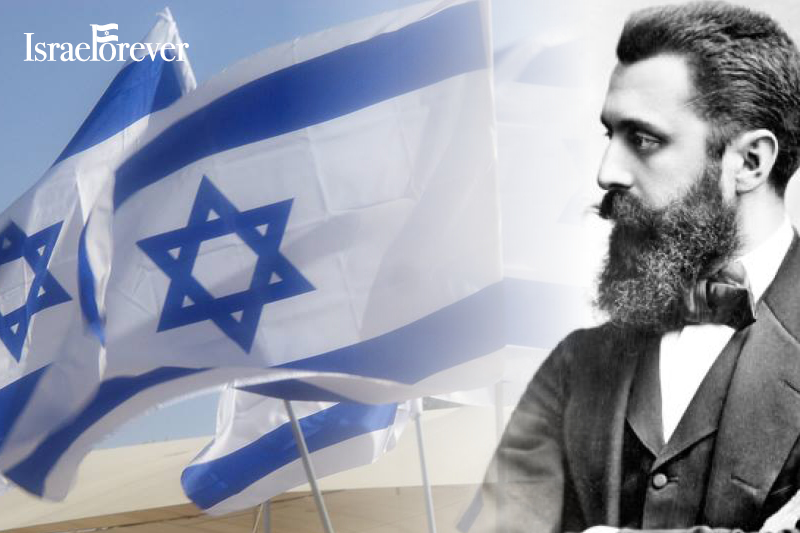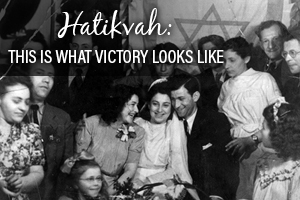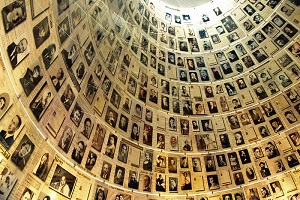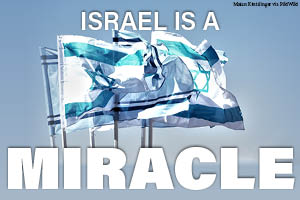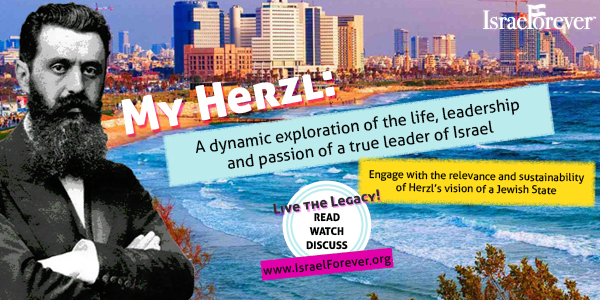The Significance of Shoah Memory to Herzl’s Legacy
By Yedidya F.
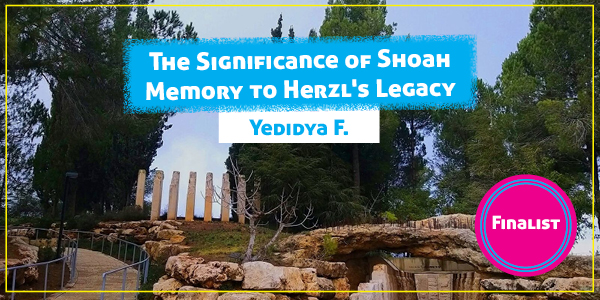
The Holocaust. The Shoah. Just mentioning those words is guaranteed to send a shiver down any Jew’s spine.
The atrocities and despicable acts committed by the Nazis over 70 years ago still haunt us to this day. But although all these animalistic crimes will never be forgotten, the Shoah did leave in its wake three crucial benefits which must not be ignored. The first: to enlighten the world on how heinous it is to allow the degradation of people to take place without putting an end to it. Second, the Shoah showed the importance of having faith, even when all seems lost. And last of all, the establishment of the State of Israel, the fulfilment of Theodor Herzl’s dreams and the dreams of Jews throughout the globe.
Between 1933-1945, world leaders and the media turned a blind eye to the extermination of the Jewish people. When the camps were finally liberated, the barbaric acts were revealed to the world, sending it into a state of shock. No one could believe that fellow humans could be treated like filth. That the notion ‘to love your fellow as yourself’ was abandoned in favour of cruelty and arrogance. This spurred compassion for the Jewish people. For the first time in hundreds of years, aiding the Jewish people became somewhat of a priority.
It started slowly at first, refugee camps here and there, but eventually immigration quotas were loosened in areas like the United States, allowing Holocaust survivors a chance at a new life. The United Nations, formed in 1945, strove “To maintain international peace and security” and this laid the foundation for a reformed world built on love, not hatred. The Nuremberg Trials were held in 1945-1946, shedding further light onto the horrors of the Holocaust.
The German government in 1953 began to reimburse Jews for the terror and trauma their people had caused the nation, despite knowing that the wound would never fully heal. All these actions were the start of restoring the Jewish people’s confidence in humanity, after humanity had no confidence in the Jews.
Herzl’s view that anti-Semitism was a not only a threat to the Jewish people but rather a threat to the world itself was being realised at last, over 40 years since his death. Herzl’s belief in the good of the gentile nations even after all they had done to the Jewish people since its inception demonstrates the value in always looking for the best in others. Even when it looked like that there was no redemption for the other nations, by them taking a stand, acknowledging that Jews are not an inferior people and in fact an asset to society itself - only then could the State of Israel be established and the Jewish nation become united once again.
One of the most provocative questions to the Jewish mind even today, is “Where was God in the Holocaust?” How come He let six million Jews perish without seemingly any intervention? Is this the “עם סגולה” “treasured people” (Devarim 7:6) of God? What if the question was inverted and instead worded “Where was man in the Holocaust?”; “Where was empathy and respect for fellow humans?”
There is a famous story about a Holocaust survivor and a siddur, which answers this question beautifully. This Holocaust survivor, named Simon Wiesenthal, was visited after the war by Rabbi Silver, who was seeking to comfort survivors of the war. The Rabbi invited the man to a special service with many others like Wiesenthal, however, he declined. Wiesenthal elaborated on his reasoning.
He told Rabbi Silver that during the Shoah, there was a religious man who smuggled a siddur into the camps and was ‘renting out’ a few minutes with it to fellow Jews in exchange for their precious bread. As a result of the sheer quantity of food which this Jew received, he died, because his body was just unable to cope with such an influx of nourishment. Which is why Wiesenthal concluded that after witnessing this immoral act he could no longer associate himself with any form of praying.
Rabbi Silver solaced Wiesenthal and explained to him that he should not focus on the man who deprived his comrades of their food. Rather, focus on the dozens of Jews who sacrificed their treasured food just to have a brief moment with the siddur!
Wiesenthal went to services the very next day.
This story shows the extent to which Jews went in order to be closer to Hashem. Their willingness to retain their faith even when God was the most obscured demonstrates that Hashem was and is constantly amidst us. Rewarding those who sacrifice themselves with life and those who take the lives of others with death.
The fact that even after the Shoah, the Jewish people had the impulse to move forward, look past the parlous state of the world and unite together for a common cause – to create a Jewish home – is a testament to Herzl’s resilient mindset to never abandon hope. Just as Herzl persisted with his idea for a Jewish state for the better of the Jewish people, so too the post-war Jews persisted with their dream of having “ארץ ישראל לעם ישראל” (“The land of Israel for the people of Israel”) for the better of the Jewish people.
Just as Herzl looked past the differences in each individual Jew and unified them into “עם אחד עם לב אחד” (“One nation with one heart”) so did the Jews of 1945 set aside their dissimilarities and come together as one. And, just as Herzl’s memory lives on today, empowering us, so too do the memories of the victims of the Holocaust live on inside of us today, fuelling us with passion to be the best possible person we can, because they did not have the chance to.
By far, the biggest post-Holocaust blessing to the Jewish people was founding the State of Israel just three years after the Jews were finally free. Having a Jewish homeland after over 2000 years in exile was the penultimate realisation of Herzl’s wish and the Jewish nation’s. For the Jews, it was not only the gravity of having a land to themselves, it was also the connection to that land and its inherent holiness which made returning to Israel even more momentous.
But this was not the first time the Jewish people felt this way. To fully comprehend the enormity of returning to the Holy Land, it is incumbent upon us to explore a parallel situation in which the Jews were also saved from a genocide and brought to the land of Israel.
The Exodus from Egypt. One of, if not the most, influential events in the history of our nation. For 210 years the Jewish people were oppressed, discriminated and tortured in order to greater develop the monopoly of Egypt. Yet, as bad as the Egyptians were, with their idols and immorality, the Jews were so assimilated that they were almost on the same level of impurity as them. They were so assimilated, that the sages teach that if Hashem would have intervened even one moment later, then the Jews would have been unable to be redeemed.
And when they were finally saved, it was not instant either. It took ten plagues, the splitting of the sea and 40 years in the desert until the Israelites actually entered Eretz Israel. Clearly, the Jewish people had to learn to not only break free from physical labour, but also from the mentality of being a slave: to be in control of one’s life, to view oneself as worthwhile and, crucially - to raise a family with these newly-acquired Jewish principles in mind.
Furthermore, the Jews’ many years in the desert, where they were guided by Hashem himself and Moses – brought about a new challenge: when the Israelites did ultimately reach the land, it was a struggle for them to become accustomed to living a life of having to sustain oneself.
In our times, God did not perform any miracles akin to the miracles of Egypt and did not send the greatest prophet of history to guide us to Israel - it was up to us to manage that. Why was this? Why could our generation not receive the same treatment as the Israelites?
The answer, I believe, is that because the generation of Egypt did not have a voice, did not have the כוח, the אומץ to live a life without God being openly by their side. How could they? The Israelites knew nothing different, that was how they grew up.
In contrast, the Jews of the last few hundred years had found these virtues and could already cope with being in charge of their fate. The generation of the 20th century did not have Moses, Aaron and Joshua. They had Herzl, Ben Gurion and Moshe Dayan. Despite not being on the same spiritual level as Moses, Aaron and Joshua, the leaders of our time were perfect because they had the passion to work with the world to solve the growing dilemma of the lack of homeland for the Jews.
In addition, we as a nation have realised that the best way to evolve our nation is to come together as one. It is no small feat that despite the political or social issues we have with each other when it comes to the safety of the State of Israel, people set aside their qualms and help in whatever way they can. Whether it be through donating to soldiers, volunteering time to fight or just spreading awareness about the conflict, Israelis always put Israel first, over themselves.
This concept is precisely what Theodore Herzl preached over 100 years ago. In order to cure anti-Semitism throughout the world, the only solution was to have a Jewish State; and to keep that dream alive the country would need to be protected at all costs. And this would be executed similarly to how Herzl gained recognition for the importance of his precepts. Just as Herzl gathered Jews to vouch for a land of their own when they were in strife, similarly, the Jews in Israel gather together when they are in strife in order to retain their home.
All these factors contribute to illustrate just how much the Shoah has had an impact on the realisation of Herzl’s values and ideologies in the present age. It began with how the Holocaust shaped the way the world saw the Jews: no longer as scapegoats, but as a nation filled with humans equal to the rest of society.
This perception then expanded to not only viewing Jews as people with rights, but also as role models for the world, since in spite of them facing a mass genocide, the Jewish people remained steadfast in their beliefs and in maintaining hope for a better future. This future was realised at last on May 5th 1948 when the State of Israel was formed after the wake of Shoah - a miraculous achievement - which was the ultimate goal of the Zionist movement led by Theodore Herzl.
Like a phoenix, the State of Israel was born amidst the ashes and has soared to great heights to fulfil its goal of being a ‘light unto the nations’. And like a phoenix, even when Israel falls, it always has the capacity to return to its former glory. As Israel continues to overcome more hurdles on its path to success, it is pivotal to acknowledge the countless people, such as the ‘Father of Zionism’, who have poured their soul into allowing our country to exist and to be a safe haven for Jews across the globe.

